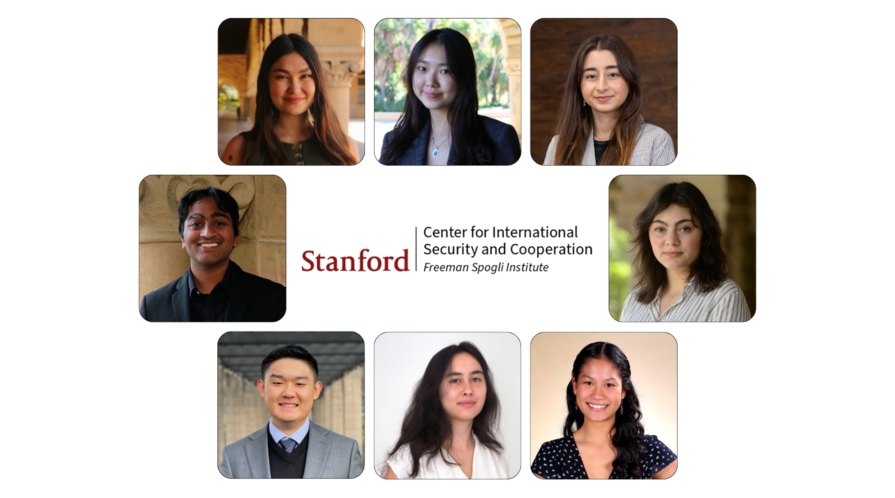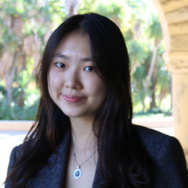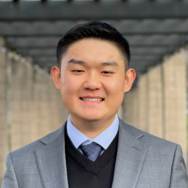Introducing Our 2025-2026 CISAC Honors Students
Introducing Our 2025-2026 CISAC Honors Students
We are thrilled to welcome eight outstanding students, who together represent nine different majors and minors, to our Honors Program in International Security Studies.

The CISAC Interschool Honors Program in International Security Studies provides an opportunity for seniors from all undergraduate schools and majors who have strong academic records and interest in international security to receive Honors in International Security Studies. Students are admitted to the program on a competitive basis during winter quarter of junior year. The award of Honors is in addition to the student's major, which may be in any department or program. The CISAC Honors Program has drawn students from 28 different major departments and programs since its inception in 2000 and has an alumni network of over 200 former students.
We are thrilled to welcome eight outstanding students to the class of 2025-26!
Meet the Students

Lara Rudar
Major: International Relations
Minor: Interdisciplinary Arts (Engineering Design)
Hometown: Dubai, UAE
Thesis Advisors: Paul Edwards and Rose Gottemoeller
Tentative Thesis Title: Climate Change as a National and International Security Threat: Military Challenges and Adaptations
Why is this topic important to the field of international security? Climate change, deemed as a ‘threat multiplier,’ poses many security risks: extreme weather conditions and the depletion of natural resources not only impact civilians through increased conflict and humanitarian crises, but also compromise military readiness and safety. By 2050, the effects from climate change are expected to cost U.S. military facilities hundreds of billions of dollars. The escalating risks of rising temperatures, flooding, and wildfires on nuclear facilities and other assets are particularly alarming, especially as the consequences are not well-documented or understood. I hope to provide insights and recommendations on integrating climate security considerations into national security strategies and international cooperation mechanisms such as NATO. It has been unfortunate to see the deprioritization of climate change in federal decision-making and the sweeping rollbacks of previous U.S. climate policies. Analyzing the impacts of climate change through a security lens can assign more political urgency to decarbonization and protecting our natural world by showing that climate action is essential for maintaining global stability.
What attracted you to the CISAC undergraduate honors program? International Relations is a broad discipline, and I have always desired to develop deep expertise in a specialized area. The CISAC honors program allows me to do just this by providing invaluable mentorship and supporting my exploration of climate security. Being a part of this distinguished community of scholars will be a cornerstone of my time at Stanford, and I hope to continue my engagement with CISAC and my incredible peers as I advance my career in International Relations.
Future aspirations post-Stanford: After pursuing a Master’s degree, I hope to work in foreign diplomacy, contribute to environmental security and sustainable development initiatives at an IGO, or advise governments on climate security decisions. I’m also interested in climate innovation and sustainable financing solutions in the private sector.
A fun fact about yourself: I speak English, Turkish, and Russian as well as a bit of Spanish and Arabic!

Suha Choi
Major: Classics & International Relations
Hometown: Seongnam, South Korea
Thesis Advisor: Scott Sagan
Tentative Thesis Title: From Vietnam to the Syrian Civil War: A Historical Analysis of North Korea’s Overseas Military Interventions and Their Impact on U.S.-ROK Alliance Strategy
Why is this topic important to the field of international security? Since October 2024, U.S. and ROK intelligence agencies have estimated that North Korea has deployed at least 11,000 troops to support Russia’s ongoing invasion of Ukraine. In light of this growing military cooperation between North Korea and Russia, this paper revisits historical precedents of North Korea’s overseas military interventions—a relatively understudied aspect of DPRK foreign policy often overshadowed by its nuclear program. By examining past interventions, such as those in the Vietnam War and the Syrian Civil War, this study aims to inform current policymaking and U.S.-ROK alliance strategy. Understanding these patterns can help address persistent alliance challenges, particularly those arising from differing threat perceptions between two allies.
What attracted you to the CISAC undergraduate honors program? Some of my most fulfilling moments at Stanford have come from attending office hours and having one-on-one conversations with faculty I admire, which naturally drew me to pursue an honors program. I’m particularly excited about the CISAC program because I value its interdisciplinary structure and the rare opportunity to learn alongside students with a wide range of academic backgrounds. I’m also interested in a career in policy research, so I see this as a meaningful chance to explore that path more deeply before graduation.
Future aspirations post-Stanford: I hope to contribute to peacebuilding and conflict resolution, though I’m still exploring whether that path will take shape through law, policy research, or government work.
A fun fact about yourself: I love visiting museums and historic sites—some of my favorites include the Renwick Gallery in D.C. and the MMCA in Seoul. I also work as a museum tour guide at the Cantor Arts Center on campus!

Amina Wase
Major: International Relations
Minor: South Asian Studies
Hometown: Dayton, OH
Thesis Advisor: Šumit Ganguly
Tentative Thesis Title: China’s Expanding Influence in Pakistan and Afghanistan: Impacts on Terrorism and Informal Security Networks
Why is this topic important to the field of international security? One of the most overlooked regions in security discourse is South Asia— with two nuclear-armed states, a Taliban-controlled Afghanistan, and domestic instability, the region poses risks for every state. In recent years, China has significantly expanded its economic and diplomatic involvement in Pakistan and Afghanistan. This trend is only expected to accelerate. The critical question now is how China’s growing presence, and how it's great power competition will shape the behaviors and strength of terrorism networks in the region. These issues hold critical, contemporary implications, most recently in the 2025 Kashmir crisis. Understanding this early phase of China’s security influence in South Asia is crucial for anticipating a shifting global order, and how the India-Pakistan-China relationship will continue to reshape regional dynamics.
What attracted you to the CISAC undergraduate honors program? The CISAC Honors Program stood out to me for its focus on using interdisciplinary approaches to better understand the most important issues of our future. The program gives me the privilege to connect with incredible scholars and frameworks that will help me think more critically about the impacts and perspectives surrounding my topic.
Future aspirations post-Stanford: In the future, I hope to pursue a law degree. I plan to contribute to U.S. foreign policy towards South Asia, and work on human rights issues in the region.
A fun fact about yourself: I am learning my fourth language— Persian!

Sidharth Gopisetty
Major: Electrical Engineering
Minor: Human Rights
Hometown: Sacramento, CA
Thesis Advisor: Srabanti Chowdhury
Tentative Thesis Title: Unveiling the Semiconductor Supply Chain and the Alliances that Drive It
Why is this topic important to the field of international security? Semiconductors are foundational to modern technological foundations, critical infrastructure, and advanced technologies, making them vital to national security. The global supply chain’s fragility and geographic concentration pose significant risks amid rising tensions. Strengthening international cooperation helps ensure supply chain resilience, reduces dependency on adversarial actors, and reinforces shared security interests across nations. Alliances among nations can facilitate coordinated investments, knowledge sharing, and standard-setting in semiconductor production. In doing so, they help safeguard technological leadership and preserve stability in an increasingly contested global landscape.
What attracted you to the CISAC undergraduate honors program? The honors program offers me a unique opportunity to bridge my background in electrical engineering with my passion for policy and strategic action. I was drawn to CISAC’s interdisciplinary approach and its commitment to bridging science, technology, and international affairs. The program not only values but actively encourages technical contributions to real-world impact, and I’ve felt fully supported in exploring how my skills can contribute to new solutions in a rapidly evolving landscape.
Future aspirations post-Stanford: I hope to build my own company focused on streamlining and accelerating supply chains, leveraging technology to enhance efficiency and resilience across sectors—from semiconductors to healthcare. At the same time, I hope to apply my industry expertise to inform policy decisions and contribute to strategic, actionable solutions at the intersection of technology and global security. I want to help shape policies that drive positive change and improve quality of life nationwide.
A fun fact about yourself: I’ve had a white eyebrow since I was six years old.

Aylin Salahifar
Major: International Relations
Minor: Data Science
Hometown: Redwood City, CA
Thesis Advisor: Russell Berman
Tentative Thesis Title: International Engagement with a Post-Assad Syria
Why is this topic important to the field of international security? The fall of Bashar al-Assad and rise of Hay'at Tahrir al-Sham (HTS) marks a critical turning point in Syria’s trajectory, raising concerns about governance, security, and reconstruction. While many post-conflict strategies focus on rebuilding state institutions and fostering political reconciliation, Syria presents several unique challenges that require tailored approaches. Two major security threats warrant attention: (1) the fate of tens of thousands of Islamic State prisoners and their families housed in poorly guarded refugee camps, and (2) the future of Syria’s Captagon trade, a vast illicit drug industry that thrived under Assad’s regime. Numerous recent studies focus on Syria’s recovery from the perspective of economic rebuilding, institutional stability, or regional politics, but entirely overlook security implications tied to these two standout threats.
What attracted you to the CISAC undergraduate honors program? The evolving security paradigm in Syria represents a critical opportunity to merge my interests in regional MENA power dynamics—particularly with regard to Iran and Turkey—and non-traditional threats posed by non-state actors. CISAC’s mentorship, interdisciplinary approach, and collaborative peer research environment provide the opportunity for me to deepen my expertise and produce a thesis with real policy implications.
Future aspirations post-Stanford: Long term, I aspire to a career in international security within the U.S. government, where I can contribute to evidence-based policy solutions for evolving security challenges in the Middle East.
A fun fact about yourself: I'm a master Jenga player :)

Taeil Matthew Kim
Major: Biology
Minor: International Relations
Hometown: Irvine, CA
Thesis Advisor: Dr. Colin Kahl, Dr. Drew Endy, and Dr. Norbert Holtkamp
Tentative Thesis Title: The Emergence of a Science and Technology Based Global Order
Why is this topic important to the field of international security? The 21st century has ushered in a new era of science and technology (S&T) with breakthroughs occurring at an unprecedented rate. Since 2022, advancements include the first images from the James Webb Telescope taken, fusion ignition achieved at the National Ignition Facility, advances in RNA technology leading to mRNA vaccines against COVID-19, and the boom in artificial intelligence (AI) as a general purpose technology (GPT). With these emerging trends, it is without a doubt the rapid development of emerging technologies is reshaping the global order. My research is centered on ascertaining the nature and mechanisms of this new S&T based international order in the modern world, especially on how AI and biotechnology as GPTs can establish and shape global dynamics, to inform policy on collaboration to advance innovation.
What attracted you to the CISAC undergraduate honors program? The CISAC honors program is unparalleled in its interdisciplinary focus with tackling international security issues along with the invaluable mentorship by faculty offered. I also find becoming a part of a tight-knit cohort with peers that are equally passionate and dedicated to international security as I am to be exciting. With CISAC in the middle of Silicon Valley and serving as a hub for leading security scholars, I cannot imagine a more perfect place to investigate my thesis ideas.
Future aspirations post-Stanford: I hope to pursue a career at the intersection of medicine, technology, and security to drive socially mindful innovation with a prioritization on improving human health.
A fun fact about yourself: I have been an avid fossil collector since 2012!

Eleanor Greyson
Major: Math and Political Science
Hometown: Greenwood Village, CO
Thesis Advisor: Avi Acharya
Tentative Thesis Title: Technological Cooperation Between States With Risk of War
Why is this topic important to the field of international security? I intend to develop a formal theory model of simultaneous cooperation and competition between adversaries. The United States and China are adversaries that compete with each other, as well as economic partners that depend on each other. How do states balance the contradictory urges to cooperate on economic issues, while competing on security issues? Such a model will have clear international security implications. When the Biden administration implemented export restrictions on semiconductors, it was essentially trying to prevent the pooling of U.S. and Chinese technological resources. The Biden administration hoped to prevent—or at least slow—China’s acquisition of advanced technology that it could use to modernize its military. However, this decision also likely deterred the Chinese government from sharing its own technological advances, which could have benefitted U.S. industries. Was Biden’s decision correct? Does it make sense for the U.S. to implement such massive sanctions on China, or should we try to cooperate to create an economic advantage? How do these simultaneous dynamics of cooperation and competition affect optimal play? My research will provide a framework for formalizing—and answering—these questions.
What attracted you to the CISAC undergraduate honors program? I plan to work in both academia and in policymaking, and I want to ensure that I understand the connection between them—how I can use my public service experience to ground my academic thinking, and how I can use my experience in academia to rigorously examine my work in policymaking. CISAC Honors will provide the mentorship and community I need to be successful as both an academic and a policymaker.
Future aspirations post-Stanford: After I graduate, I plan to pursue a PhD in Political Science, likely specializing in some combination of international relations and formal theory. After that, I intend to transition to public service—perhaps in the State Department.
A fun fact about yourself: I'm an aspiring—but objectively terrible—lockpicker!

Pleng Kruesopon
Major: Political Science
Hometown: Nonthaburi, Thailand
Thesis Advisor: Larry Diamond
Tentative Thesis Title: Bamboo Diplomacy: Thailand’s Geostrategic Balance Amidst Great-Power Rivalry
Why is this topic important to the field of international security? As the international community adjusts to the United States' isolationist policies and China’s growing global dominance, the exploration of Thailand’s domestic reaction to a rapidly evolving geopolitical landscape is increasingly essential. The United States' hegemonic power is declining, creating a new power vacuum between Western-led liberal democracy and China’s “people’s democracy.” Many developing nations, especially in Asia, have begun strengthening ties with China, viewing the CCP as more stable, strong, and reliable. Hence, the following question will be examined: How does Thailand’s Bamboo Diplomacy Influence our Geopolitical Leverage Amid the Contemporary Great-Power Rivalry Between the United States and China?
What attracted you to the CISAC undergraduate honors program? My home country—Thailand—is the only country in Southeast Asia to avoid colonial rule. Hence, I am curious to examine the origins of our bamboo diplomacy and how its position within Thailand’s unique governance structure—a constitutional monarchy—has impacted our internal stability and geopolitical posturing. Situated in the fastest-developing region in the world--Southeast Asia--- I hope to bring light to Thailand's unique way of navigating the changing global order.
Future aspirations post-Stanford: I aspire to become an international lawyer or diplomat!
A fun fact about yourself: My younger sister and I love scuba diving, and we founded an NGO called Care for Coral together!
